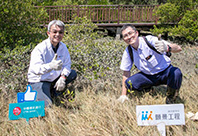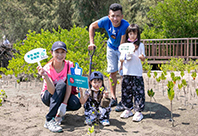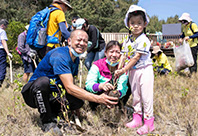Environment
In accordance with the goal of net-zero emissions by 2050 by parent company CTBC Holding, CTBC Bank has been actively planning energy conservation and carbon reduction, while laying out a renewable energy power purchase program to fulfill its environmental sustainability responsibilities.
In 2022, CTBC Bank launched ALL ME, Taiwan's first credit card made from recycled marine debris. In the same year, all credit cards from the Bank had their product carbon footprints verified according to British Standards Institution (BSI) ISO 14067, with each found to have a carbon footprint of approximately 804.6 grams.
Since 2020, CTBC Bank has actively collaborated with the Vision Project to support the Plant a Tree for the Future initiative, demonstrating a steadfast commitment to environmental sustainability over the past three years. This initiative has garnered the participation of nearly 300 employees, as well as their friends and family, resulting in the successful planting of 6,000 tree saplings.
We have been promoting various energy integration projects and objectives on a triennial basis. We have achieved our targets of reducing electricity consumption by 6% each in both phase 1 (2015–2017) and phase 2 (2018–2020). In 2022, CTBC Financial Park and CTBC Bank cut their Scope 2 carbon emissions by a total of 793 MT, and reduced electricity consumption by 1.55 million kWh (2.16%) from 2021, achieving our phase 3(2021-2022) target of reducing electricity consumption by 1% each year with 2020 as the base year. We have set the following short-term (2023), medium-term (2025), and long-term (2030) cumulative carbon reduction targets based on the SBTi, using 2021 as the base year: an 8.4% reduction by 2023, a 16.8% reduction by 2025, and a 37.8% reduction by 2030. We evaluate our green energy procurement rate annually in accordance with the SBTi’s carbon reduction goals.






The main source of our operating water comes from the state-owned utility Taiwan Water Corp., and we do not use any ground-water. We provide water for use only by staff members and customers in our headquarters and branch locations, and thus do not exert any negative impact on water sources. The discharged water is sewage from daily use, and the disposal method complies with regulation relevant to water pollution prevention. To reduce the potential impact and risks caused by water conditions, CTBC Financial Park fully adopts rainwater retrieving equipment, recycling system and water-saving equipment, and photoelectric switch to adjust the water volume.
We support and comply with Taipei City Government environmental protection policies by reducing food waste and other types of waste. As early as 2016, CTBC Financial Park’s employee cafeteria switched from disposable tableware to reusable porcelain dinnerware. It also replaced buffet-style dining with set meals featuring fixed portions, cutting food waste by approximately 60%. Also since 2016, reusable food waste has been converted into organic fertilizer, which is then used for landscaping around the park.
In order to achieve waste reduction goals, waste separation units are located in CTBC Financial Park’s employee break rooms to separate recyclables and reduce the amount of general waste. Recycling companies collect the recyclable waste and qualified waste removal companies transfer the general garbage to the incineration plant for incineration. In 2022, our expenditure on waste treatment was approximately NT$5.4 million. With 2020 as the base year, our target for 2023 is to reduce waste by 1%. In addition, in coordination with the Taipei municipal government's “Keep Trash Off the Ground” program, a special garbage collection area and kitchen waste collection facilities have been created in CTBC Financial Park’s basement floors for effective waste sorting and recycling.
Vendors can be categorized as: "Office Equipment," "IT Equipment," "Advertising and Media," "Construction and Maintenance," and "Other.” We require suppliers to be committed to employee rights and health, prohibit the employment of people under the age of 15, comply with the relevant labor laws, and implement occupational health and safety education and ESG-oriented corporate social responsibilities. The procurement of various related products and source materials and the manufacturing process must not include any toxic controlled substances stipulated by the Environmental Protection Administration or any controlled substances stipulated by international conventions. All other subcategories are listed below:

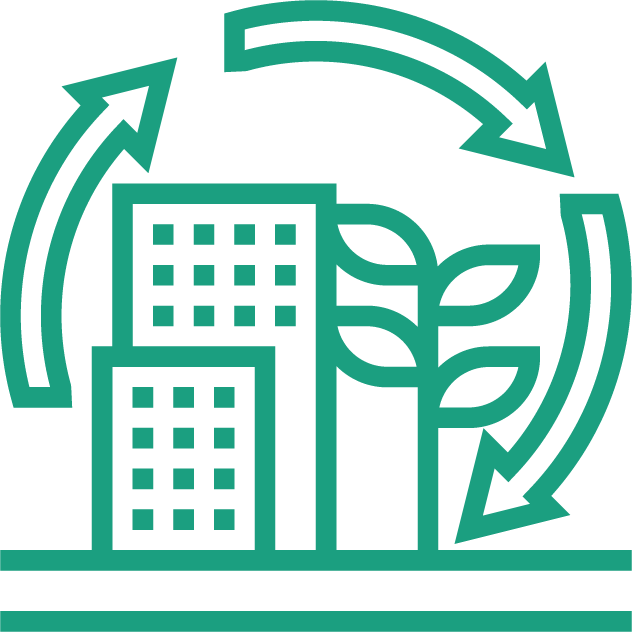
- Energy-using office equipment must comply with the low energy consumption standards of the Bureau of Energy; where necessary, it must have relevant energy conservation labels and green procurement environmental labels as well as comply with relevant energy conservation regulations.

equipment
- The servers, monitors, and computers, including notebook computers, comprising our IT facilities must comply with the International Energy Conservation Code.

and media
- The agencies and outlets that create and show our advertising and marketing materials must fulfill their social responsibility to provide the audience with diverse and comprehensive information and to ensure its right of access to the media.

- Use green building materials that comply with national norms and have green building materials certification seals. All materials used in renovations shall comply with the inspection standards of the National Bureau of Standards, national energy standards, and fire safety regulations.

- The leased or purchased of official vehicles leased shall comply with the various national standards and regulations.
According to a U.N. Environment Programme report, approximately 80,000 tons of plastic waste flow into the ocean each year. In 2022, as part of its ongoing sustainable environmental protection and carbon footprint reduction efforts, CTBC Bank launched ALL ME, Taiwan's first credit card made from recycled marine debris, producing a total of 50,000 cards. This initiative aims to tackle the issue of plastic waste. The materials used for the ALL ME cards are sourced from discarded PET bottles collected during beach cleanups. The Bank has employed personnel specifically for beach cleaning, resulting in reduced marine pollution, the transformation of waste into usable resources, and the creation of local job opportunities. During the production process, no toxic gases, such as dioxins, are generated through incineration. To achieve zero carbon emissions in the production process, a carbon management system was implemented. Moreover, the Bank continues to incorporate the principles of sustainable environmental protection into other financial products. In the same year, all credit cards from the Bank had their product carbon footprints verified according to British Standards Institution (BSI) ISO 14067, with each found to have a carbon footprint of approximately 804.6 grams.
- We grow nearly 131 types of ferns and indigenous plants in Sanchong World Trade Park at our headquarters, helping preserve the biodiversity of Taiwan’s fern flora.
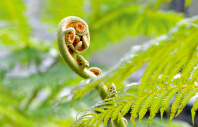
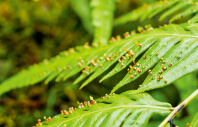
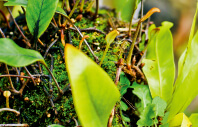
- The Bank signed the Tamsui River Convention in support of the “Do One Thing for Tamsui River” campaign to help create a healthy and clean Tamsui River basin and prevent excessive marine pollution.
- Since 2020, CTBC Bank has actively collaborated with the Vision Project to support the Plant a Tree for the Future initiative, demonstrating a steadfast commitment to environmental sustainability over the past three years. This initiative has garnered the participation of nearly 300 employees, as well as their friends and family, resulting in the successful planting of 6,000 tree saplings. In 2022, the tree planting activity was conducted in partnership with the Tse-Xin Organic Agriculture Foundation. A total of 2,000 saplings were planted in the Wangzailiao Sand Bar in Qigu District, Tainan City, and the Zhuangwei Sand Dunes Ecological Park in Yilan County. Employees, along with their friends and family, were encouraged to step out of their offices and actively participate in green actions by planting various species such as the endemic white-flowered black mangrove, as well as windbreak species like sea hibiscus, thatch screwpine, coastal she-oak, and beach cabbage. These efforts aim to establish coastal forests that serve as a crucial "buffering protection" measure, safeguarding the coastline while preserving biodiversity and regulating climate. CTBC Bank proactively addresses climate change and biodiversity concerns while promoting environmental sustainability. In the future, the bank intends to engage customers and personnel in a wider range of green initiatives, fostering a collective effort towards achieving long-term environmental sustainability goals.
